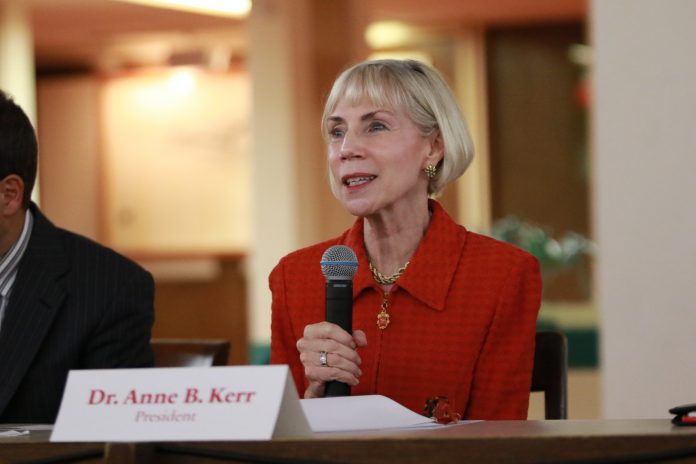
Peter Edgar
President Dr. Anne Kerr and Lakeland Assistant Chief of Police Rick Taylor spoke to the residents of Allan Spivey Hall in their lobby at the beginning of November regarding the college’s and the state’s policies following a string of incidents over the past two months.
Kerr called on students to act as a better community based on the history and the expectations of the college. Taylor, in turn, spoke about the real-world legal repercussions of the things the department of Student Accountability has been working to resolve.
“We’re going to have to work on an exit plan for some of these people who are so disrespectful to other people,” Kerr said. “We’re going to ask your help in identifying those young men who may not have the character or the maturity to be in this community; they might not fit this mold of excellence that we have at Florida Southern—the majority, the 99.9 percent of you do.”
The meeting was attended by the near-entirety of Spivey Hall, including Resident Advisors and Community Directors. Amanda Blount and Maggie Merryday, Assistant Dean of Student Development and Assistant Director of Accountability, Education, and Compliance, respectively, also attended.
Over the past semester, Student Accountability, the Resident Advisor team, the Residential Life department, Student Development, the Safety office and Facilities Maintenance have all been involved in dealing with the repercussions of negative student action.
Events have ranged from severe damage to restroom facilities like sinks and toilet seats and the removal of fire exit sign designations to events, threatening notes and a dildo taped to the door of Resident Advisors and students who are members of the LGBTQ community, which each speaker chose to address differently.
“We haven’t had this problem since I’ve been at Florida Southern,” Kerr said. “This is my 14th year. Regardless of how you feel politically and what your likes and dislikes may be, or your level of tolerance, we’re in this community together.”
“When we start talking about being disrespectful to other people with differences—” the language that Kerr used “—see, in my world, I call that harassment… There’s hate crimes,” Taylor said. “Depending on what you’re doing… it can actually be a felony.”
Kerr began by outlining the legacy of the college as a whole, noting the kinds of people—-a secretary general of OPEC, an executive vice president of NASCAR, and various noted athletes—who lived in Spivey Hall at one point.
The students present were selected Out of thousands of applicants, Kerr said, and should act within the awareness of that privilege.
She also appealed to the financial burden that many families face when the cost of repairing damages is distributed over the entire building, as it is when no individual is identified in the case of destruction of property.
The President noted her distaste with the fact that she even had to make her address. “I’m hoping that it will inspire you to exhibit those kinds of behaviors for which we’ve always been known,” Kerr said. “FSC is a place of great pride. I hope that you will feel that. I know the majority of you don’t need to be here and don’t need to spend your time listening to me nanner on like your mother, but nonetheless, it’s reached that stage where we have to work together to put a stop to this.”
Nevertheless, she and Taylor both acknowledged the importance of these talks.
“You wouldn’t be sitting here in this room tonight if you didn’t have great potential, and there are too many young men that we turned away—and that we had to say ‘no’ to them being here—for us not to try to tackle these problems,” Kerr said.
Taylor noted that this was the first time in his 22 years in the Lakeland Police that he had to come to speak to a group of college students at any school in reference to acts of destruction and hate on their campus.
He tied the incidences of hate crimes to Shepard and Byrd, by way of whose deaths federal hate crime statutes were enacted. Depending on the outcome of bullying (and cyberbullying, which also has enhanced penalties in Florida), one could be sentenced to 30 years to life in prison.
The speeches are for a reason, Taylor said, “because there’s people in here that evidently think they’re better than everyone else, or that they think that they can do whatever the heck they want.”
As a result of the importance, both Taylor and Kerr stressed the importance of the “exit plan.”
“Figure out who this is and get them out of here,” Taylor said. “They don’t deserve to be here with you guys.”
Following the event, Marc Tuschen, Assistant Dean of Student Development for Community Living, and Page Valtinson, Director for Residential Education, held the first of four events centered around “living a values-based life.” Each resident of the hall is required to attend one of the events.
As a launching point for discussion, Tuschen and Valtinson asked each member of the community to write on one sticky note what they currently feel about the hall and on another what they hope the Spivey community could be or how they wish people would refer to it.
Some Resident Advisors who observed the sticky-note activity agreed that one possible reason that Spivey Hall served as the epicenter for so many crime-level events was the trope of “Spivey boys”: a non-representative characterization that types men of the hall as “gross,” “aggressive,” “immature,” and “disobedient.”
Though many students used the sticky note exercise to joke about making the hall co-ed, there were just as many students that felt that Spivey was currently characterized as “old,” “dirty,” “trash,” “unsafe,” “trippin’,” “sad,” “wildin’,” “a jungle,” “a few idiots” and “unwelcoming.”
“That perception applies to all of you regardless of whether you’re committing these acts,” an administrator said.
How do students wish Spivey hall were labeled? For starters, “respectful,” “enjoyable,” “lit,” “home,” “a’ight,” “chill, “happy,” “no hurt,” “classy” and “better.”
These adjectives were what Community Living was looking for: they then asked how many of the students present would be willing to commit to living in such a way that Spivey reflected those.
“I believe you can,” Tuschen said. “You can be the reason why people come or don’t come.”
Community Living reiterated the clear expectations of the Cornerstone of Florida Southern College and called on students to “own their experience” by reporting campus crime when they saw it, anonymously or otherwise. Staff asked the students to hold each other accountable and especially to hold visitors accountable to the escort policy.
Students wishing to anonymously report such behavior as was addressed by Dr. Kerr and Officer Taylor on campus may do so through the Office of Accountability or directly to the Lakeland Police Department by way of an app, P3 Tips, or by way of the Crimestoppers hotline, 1-(800)-226-TIPS.







